
Bangladesh competed at the 2011 World Aquatics Championships in Shanghai, China between July 16 and 31, 2011.

Bangladesh competed at the 2011 World Aquatics Championships in Shanghai, China between July 16 and 31, 2011.
Bangladesh qualified 2 swimmers. [1]
| Athlete | Event | Heats | Semifinals | Final | |||
|---|---|---|---|---|---|---|---|
| Time | Rank | Time | Rank | Time | Rank | ||
| Mahfizur Rahman Sagor | Men's 50m Freestyle | 24.82 | 63 | did not advance | |||
| Men's 100m Freestyle | 54.18 | 71 | did not advance | ||||
| Shajahan Ali | Men's 50m Breaststroke | 30.88 | 40 | did not advance | |||
| Men's 100m Breaststroke | 1:10.22 | 75 | did not advance | ||||

Bangladesh, officially the People's Republic of Bangladesh, is a country in South Asia. It is the eighth-most populous country in the world and is among the most densely populated countries with a population of nearly 170 million in an area of 148,460 square kilometres (57,320 sq mi). Bangladesh shares land borders with India to the north, west, and east, and Myanmar to the southeast. To the south, it has a coastline along the Bay of Bengal. It is narrowly separated from Bhutan and Nepal by the Siliguri Corridor, and from China by the mountainous Indian state of Sikkim in the north. Dhaka, the capital and largest city, is the nation's political, financial, and cultural centre. Chittagong is the second-largest city and is the busiest port on the Bay of Bengal. The official language of Bangladesh is Bengali while Bangladeshi English is also used in the government and official documents alongside Bengali.

Dhaka, formerly known as Dacca, is the capital and largest city of Bangladesh. It is the ninth-largest and seventh-most densely populated city in the world. Dhaka is a megacity, and has a population of 10.2 million residents as of 2022, and a population of over 22.4 million residents in Dhaka Metropolitan Area. It is widely considered to be the most densely populated built-up urban area in the world. Dhaka is the most important cultural, economic, and scientific hub of Eastern South Asia, as well as a major Muslim-majority city. Dhaka ranks third in South Asia and 39th in the world in terms of GDP. Lying on the Ganges Delta, it is bounded by the Buriganga, Turag, Dhaleshwari and Shitalakshya rivers. Dhaka is also the largest Bengali-speaking city in the world.

The Bangladesh Awami League, often simply called the Awami League or AL, is one of the major political parties in Bangladesh. The oldest existing political party in the country, Awami League successfully lead Bangladesh to the independence. One of the two most dominant parties in the country, along with its archrival Bangladesh Nationalist Party, it has been the ruling party since 2009, and has since been described as authoritarian.

The Bangladeshi taka is the currency of the People's Republic of Bangladesh. In Unicode, it is encoded at U+09F3৳BENGALI RUPEE SIGN.
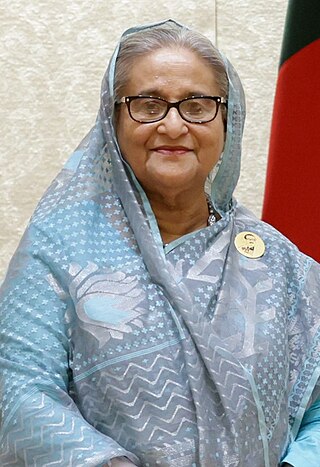
Sheikh Hasina Wazed is a Bangladeshi politician who has served as the tenth prime minister of Bangladesh from June 1996 to July 2001 and again since January 2009. She is the daughter of Sheikh Mujibur Rahman, the founding father and first president of Bangladesh. Having served for a combined total of over 19 years, she is the longest serving prime minister in the history of Bangladesh. As of 31 May 2024, she is the world's longest-serving female head of government.

The Bangladesh Liberation War, also known as the Bangladesh War of Independence, or simply the Liberation War in Bangladesh, was a revolution and armed conflict sparked by the rise of the Bengali nationalist and self-determination movement in East Pakistan, which resulted in the independence of Bangladesh. The war began when the Pakistani military junta based in West Pakistan—under the orders of Yahya Khan—launched Operation Searchlight against the people of East Pakistan on the night of 25 March 1971, initiating the Bangladesh genocide.

The Bangladesh men's national cricket team, popularly known as The Tigers, is administered by the Bangladesh Cricket Board (BCB). It is a Full Member of the International Cricket Council (ICC) with Test, One-Day International (ODI) and Twenty20 International (T20I) status.

.bd is the Internet country code top-level domain (ccTLD) for Bangladesh. It is administered by the Ministry of Posts, Telecommunications and Information Technology. Registrations are at the third level beneath several second-level labels, paralleling the oldest gTLDs; registration is open except in the gov and mil subdomains, which are limited to authorized entities in the Bangladesh government. Though online registration available, currently BTCL only allowing Second-level domain registration of .bd domain for only Bangladeshi citizens. Means, It only allows the structure of websites like - example.com.bd, example2.com.bd. example3.com.bd; but not like - example.bd, example2.bd, example3.bd.
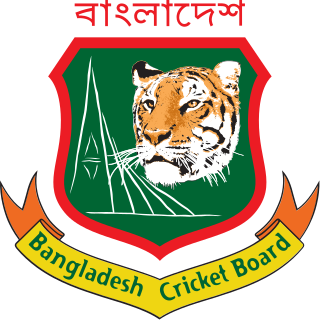
The Bangladesh Cricket Board is the governing body of cricket in Bangladesh. It became an associate member of the International Cricket Council (ICC) in 1977 and a full member on 26 June 2000. BCB has three teams which represent Bangladesh in international cricket, which are Bangladesh men's national cricket team, Bangladesh women's national cricket team and Bangladesh under-19 cricket team.

The India–Bangladesh enclaves, also known as the Chiṭmahals and sometimes called Pasha enclaves, were the enclaves along the Bangladesh–India border, in Bangladesh and the Indian states of West Bengal, Tripura, Assam and Meghalaya. The main body of Bangladesh contained 102 Indian enclaves, which in turn contained 21 Bangladeshi counter-enclaves, one of which contained Dahala Khagrabari, an Indian counter-counter-enclave, the world's only third-order enclave when it existed. The Indian mainland contained 71 Bangladeshi enclaves, which in turn contained 3 Indian counter-enclaves. A joint census in 2010 found 51,549 people who were residing in these enclaves: 37,334 in Indian enclaves within Bangladesh and 14,215 in Bangladeshi enclaves within India.
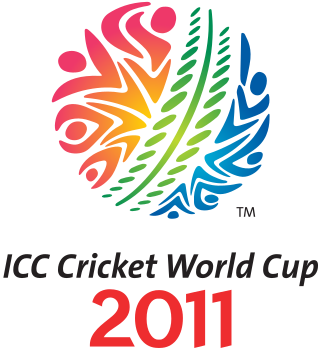
The 2011 ICC Cricket World Cup was the tenth Cricket World Cup. It was played in India, Sri Lanka, and for the first time in Bangladesh. India won the tournament, defeating Sri Lanka by 6 wickets in the final at Wankhede Stadium in Mumbai, thus becoming the first country to win the Cricket World Cup final on home soil. India's Yuvraj Singh was declared as the player of the tournament. This was the first time in World Cup history that two Asian teams had appeared in the final. It was also the first time since the 1992 World Cup that the final did not feature Australia.
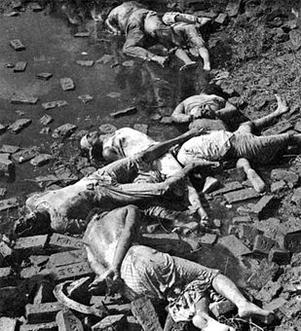
The Bangladesh genocide was the ethnic cleansing of Bengalis, especially Bengali Hindus, residing in East Pakistan during the Bangladesh Liberation War, perpetrated by the Pakistan Armed Forces and the Razakars. It began on 25 March 1971, as Operation Searchlight was launched by West Pakistan to militarily subdue the Bengali population of East Pakistan; the Bengalis comprised the demographic majority and had been calling for independence from the Pakistani state. Seeking to curtail the Bengali self-determination movement, erstwhile Pakistani president Yahya Khan approved a large-scale military deployment, and in the nine-month-long conflict that ensued, Pakistani soldiers and local pro-Pakistan militias killed between 300,000 and 3,000,000 Bengalis and raped between 200,000 and 400,000 Bengali women in a systematic campaign of mass murder and genocidal sexual violence. In their investigation of the genocide, the Geneva-based International Commission of Jurists concluded that Pakistan's campaign involved the attempt to exterminate or forcibly remove a significant portion of the country's Hindu populace.
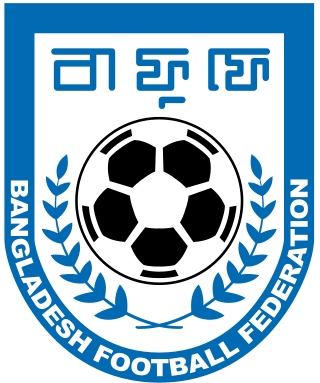
Bangladesh Football Federation is the governing body that administers the sport of association football in Bangladesh. It is in charge of running the country's men's and women's national teams, as well as the Bangladesh Premier League and various other competitions and tournaments. The BFF was one of founding members of the South Asian Football Federation. It is based at BFF Bhaban, in the Motijheel Thana of the country's capital, Dhaka.
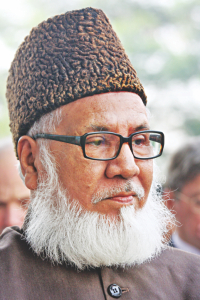
Motiur Rahman Nizami was a politician, former Minister of Bangladesh, Islamic scholar, writer, and the former leader of the Bangladesh Jamaat-e-Islami. He is noted for leading the terror squad Al-Badr during the Bangladesh Liberation War. On 29 October 2014, he was convicted of masterminding the Demra massacre by the International Crimes Tribunal of Bangladesh. Nizami was the Member of Parliament for the Pabna-1 constituency from 1991 to 1996 and again from 2001 to 2006. He also served as the Bangladeshi Minister of Agriculture and Minister of Industry.
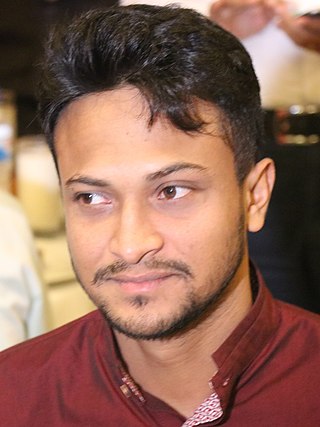
Khondaker Sakib Al-Hassan is a Bangladeshi cricketer and politician. He is a member of Parliament for Magura-1. He is known for his aggressive left-handed batting style in the middle order and controlled slow left-arm orthodox bowling. He is widely regarded as the greatest Bangladeshi sportsman and one of the greatest all-rounders of all time.
Federation Cup, also known as Bangladesh Federation Cup, is Bangladesh's premier cup competition in men's association football. The competition started in 1980 and is run by the Bangladesh Football Federation which is responsible for all types of competitive matches in the country. The teams from the country's premier league and other clubs compete in the tournament while occasionally Indian sides were invited in the past. Most of the matches are played in the country's main football venue Bangabandhu National Stadium. The winners of the tournament earn a slot in the qualifying round of the AFC Cup.

Netrokona-4 is a constituency represented in the Jatiya Sangsad of Bangladesh since 2008 by Rebecca Momin of the Awami League.
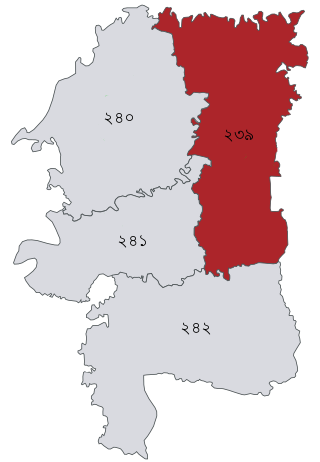
Habiganj-1 is a constituency represented in the Jatiya Sangsad of Bangladesh since 2019 by Gazi Mohammad Shahnawaz of the Awami League.

Habiganj-2 is a constituency represented in the Jatiya Sangsad of Bangladesh since 2008 by Abdul Majid Khan of the Awami League.

Jhenaidah-4 is a constituency represented in the Jatiya Sangsad of Bangladesh since 2014.